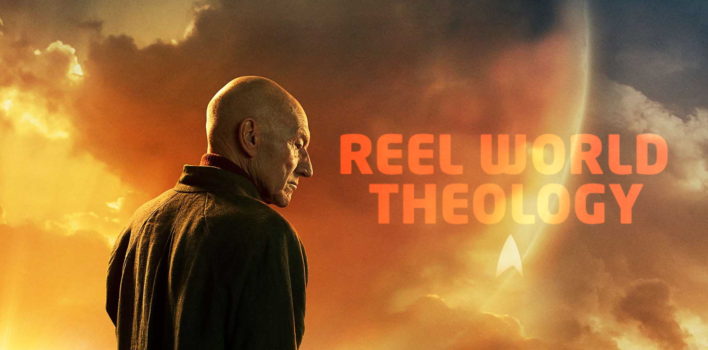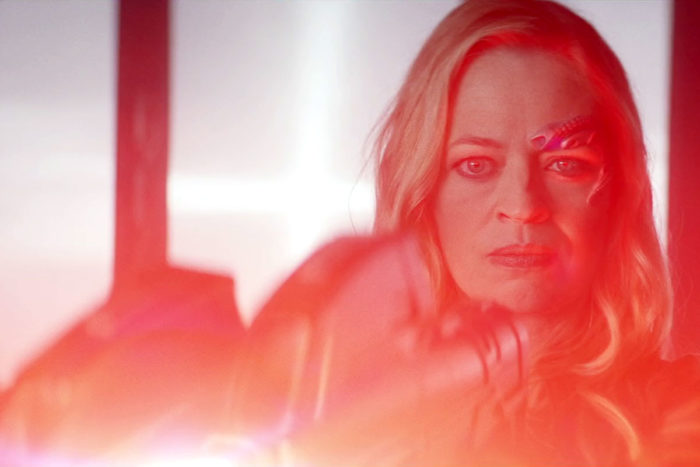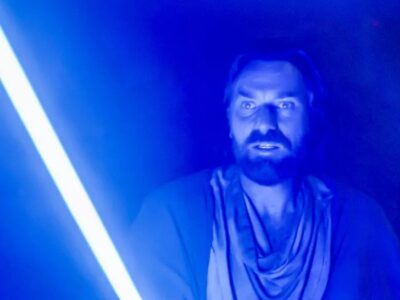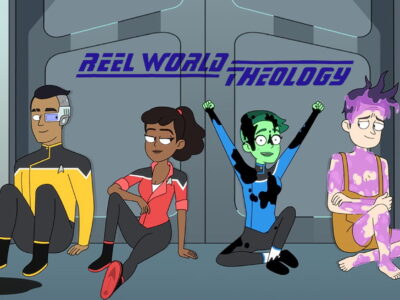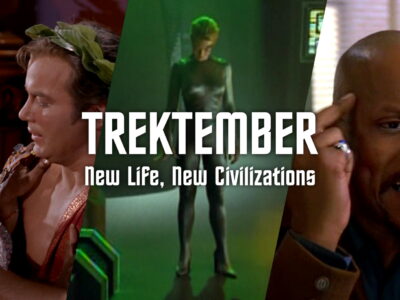“Stardust City Rag” – Star Trek: Picard S1E05
Note: I can’t very well begin this article any other way than the episode did: with spoilers. Make sure you’ve seen “Stardust City Rag” before reading any further, as well as Voyager’s season 7 episode “Imperfection.”
Picard still thinks there’s a place in the galaxy for mercy. I didn’t want to disillusion him. Somebody out here ought to have a little hope.
—Seven of Nine, “Stardust City Rag”
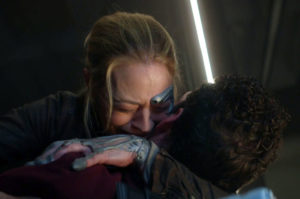 Well, this was certainly the most rugged episode of Star Trek yet. Watching Icheb’s vivisection was right up there on the gore scale with watching a villain’s face split apart in Star Trek: Insurrection, but without the catharsis of seeing a crooked admiral get his just desserts; and with a particular twinge of painful irony when you think about Icheb’s past, and how that connects to what he was murdered for.
Well, this was certainly the most rugged episode of Star Trek yet. Watching Icheb’s vivisection was right up there on the gore scale with watching a villain’s face split apart in Star Trek: Insurrection, but without the catharsis of seeing a crooked admiral get his just desserts; and with a particular twinge of painful irony when you think about Icheb’s past, and how that connects to what he was murdered for.
Though this episode delivered more action, more story, and more character development than any episode of Picard’s story yet—not to mention a significant and welcome quickening of the pace of the show—it was undoubtedly Seven of Nine’s show. Sure, Raffi’s character development was marvelous, Jurati’s was mystifying, but Jeri Ryan stepped back into her role flawlessly; and already has many in the Star Trek fandom (count me among them) clamoring for a show about the Fenris Rangers in the time between the fall of the Neutral Zone and Seven’s appearance aboard the La Sirena.
But you can’t talk about Seven of Nine on Freecloud without talking about Icheb.
The Tragedy of Icheb, son of Seven
Icheb: If the Captain were dying, you’d risk your life to save her, wouldn’t you? And when you [Janeway] respond to a distress call, you’re risking the life of everyone on this ship to respond to the aid of strangers.
Janeway: He’s right.
Seven: Captain, he’s just a child.
Janeway: I don’t think he is. Not anymore.
—Star Trek: Voyager Season 7, Episode 2: “Imperfection”
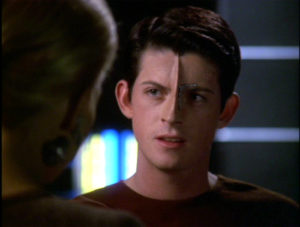 If you aren’t familiar with the character, Icheb was one of four children who were rescued from the Borg Collective by Janeway and her crew in the middle of Star Trek: Voyager’s sixth season. Though the other children found families in the Delta Quadrant, Icheb remained with the crew throughout their trip and eventually returned with Voyager to Earth as a Starfleet cadet. He was, as Seven notes to Bjayzl before blowing her to atoms, Seven of Nine’s surrogate son during the last two years of the ship’s journey home; and from his first appearance in “Collective” through their return in “Endgame,” Seven taught him how to be an individual (and learned more about humanity herself in the process).
If you aren’t familiar with the character, Icheb was one of four children who were rescued from the Borg Collective by Janeway and her crew in the middle of Star Trek: Voyager’s sixth season. Though the other children found families in the Delta Quadrant, Icheb remained with the crew throughout their trip and eventually returned with Voyager to Earth as a Starfleet cadet. He was, as Seven notes to Bjayzl before blowing her to atoms, Seven of Nine’s surrogate son during the last two years of the ship’s journey home; and from his first appearance in “Collective” through their return in “Endgame,” Seven taught him how to be an individual (and learned more about humanity herself in the process).
But their closeness goes even deeper than that. Voyager’s season 7 episode “Imperfection” was a character study on Seven and Icheb; and when Seven’s life was endangered due to a malfunctioning cortical node, Icheb insistently—almost violently—donated his own to save her.
And ten years later, as a Starfleet lieutenant aboard the USS Coleman, Icheb was captured and dissected by a villainous sawbones for a cortical node he no longer had.
 The tragedy of Icheb gets more painful every time I see it; not least because of Icheb’s fierce dedication to self-sacrifice and his dauntless adherence to the best of Starfleet. He was even captured, in the end, because he was trying to help a stranger. Icheb represents cooperation, not leaving anyone behind, working together to accomplish a goal bigger than what anyone could accomplish individually, voluntary sacrifice to save another—and with his death, we have to wonder if Starfleet still even stands for those things.
The tragedy of Icheb gets more painful every time I see it; not least because of Icheb’s fierce dedication to self-sacrifice and his dauntless adherence to the best of Starfleet. He was even captured, in the end, because he was trying to help a stranger. Icheb represents cooperation, not leaving anyone behind, working together to accomplish a goal bigger than what anyone could accomplish individually, voluntary sacrifice to save another—and with his death, we have to wonder if Starfleet still even stands for those things.
Because, make no mistake, his blood is on Starfleet’s hands.
What Law?
I’m not here for a lecture. You think of me as a vigilante, fine. Ranging is my job. It’s not saving the galaxy, it’s helping people who have no one else to help them. It’s hopeless, and pointless, and exhausting, and the only thing worse would be giving up.
—Seven of Nine, “Stardust City Rag”
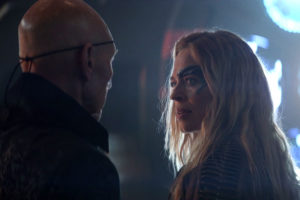 Seven enters the La Sirena’s holographic Chateau Picard frustrated with Jean-Luc, and for good reason: she sees him as having given up on hope for the Romulan people, and the resulting lawlessness in the Neutral Zone as proving the old adage that “the only thing necessary for the triumph of evil is that good men do nothing.” And I think she’s right. Picard seems to, too; in fact, you might well say that this whole series is about the rebuilding of a broken man (oh wait, I did).
Seven enters the La Sirena’s holographic Chateau Picard frustrated with Jean-Luc, and for good reason: she sees him as having given up on hope for the Romulan people, and the resulting lawlessness in the Neutral Zone as proving the old adage that “the only thing necessary for the triumph of evil is that good men do nothing.” And I think she’s right. Picard seems to, too; in fact, you might well say that this whole series is about the rebuilding of a broken man (oh wait, I did).
But Starfleet is also to blame for the crisis; the Federation’s highest ideals of help and sacrifice and rescue have vanished in the face of hardship. Maybe, as Maddox and Raffi suspect, there’s more to the attack than it seems; but the Federation still, of their own volition, retreated to their safe worlds. They sat on their laurels, secure in the knowledge that they don’t have much to fear from the Hobus Supernova or the lawlessness that it spawned, confident that they don’t have anything to fear from abdicating their responsibility to the galaxy around them.
Tragically, in a world where those who should be helping have abdicated their responsibility, hope goes away. Without light, the darkness closes in, leaving only vigilantes like Seven to fight for the helpless.
That world is not fiction. Because those who should be helping have abdicated their responsibility: us. The Church. David Platt writes,
I wonder if followers of Christ 150 years from now will look back at Christians in America today and ask, “How could they live in such big houses? How could they drive such nice cars and wear such nice clothes? How could they live in such affluence while thousands of children were dying because they didn’t have food and water? How could they go on with their lives as though the billions of poor didn’t even exist?”
—Radical: Taking Back Your Faith from the American Dream
Our affluence isn’t evil. But the way we cling to it, the way we pull back while people we could help die around the world (and even in our own communities), certainly is. Platt continues,
[Enough children die in the world in the time our worship services take that] if it were our kids starving, they would all be gone by the time we said our closing prayer. We certainly wouldn’t ignore our kids while we sang songs and entertained ourselves, but we are content with ignoring other parents’ kids.
—Radical: Taking Back Your Faith from the American Dream
Seven of Nine has lost hope, and all she has left is revenge. And because we’ve abdicated our responsibility, hope has gone from billions of people worldwide. Because we’ve pulled away from the responsibility to help, because we’ve decided “we can’t save everyone, so why bother saving anyone?” we face a refugee crisis and a global health crisis and a food shortage and global unrest and wars and corruption on a massive scale.
We could help. We should help. We were commissioned to help. To render aid, to speak truth to power, to come alongside those in the trenches and show them they’re not alone. To save lives.
But be doers of the word, and not hearers only, deceiving yourselves.
—James 1:22, ESV
But, to paraphrase Picard from the first episode, “we are no longer the Church. We withdrew. The world is mourning, burying its dead, and the Church has slunk from its duties. The decision to call off the rescue and to abandon those people we have been called to save is not just dishonorable. It’s downright criminal!”
To be sure, many churches do help. Many Christians do help. But, in this episode, we really see the fallout from the Federation’s failure. We see what it will look like if the global Church continues to shrink from its responsibility to “the least of these.” We see how lives can be destroyed, without the light of Christ to illuminate the dark places. We see Seven, displaying what the world becomes when it loses the hope that only we can provide.


